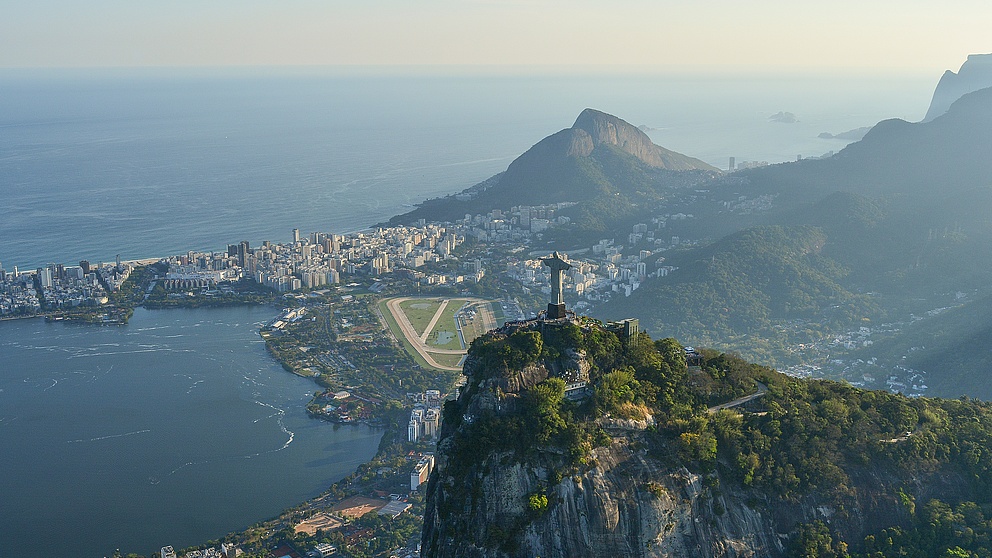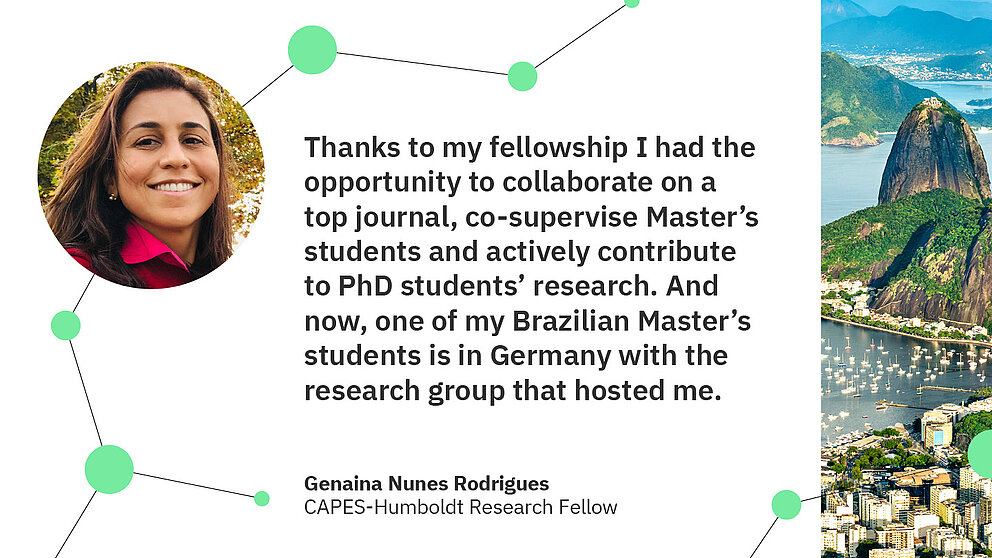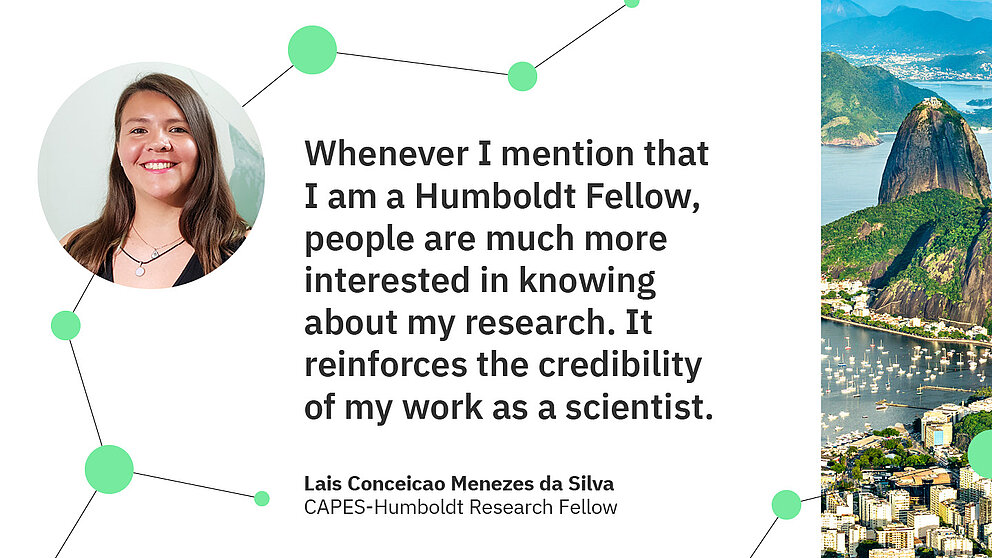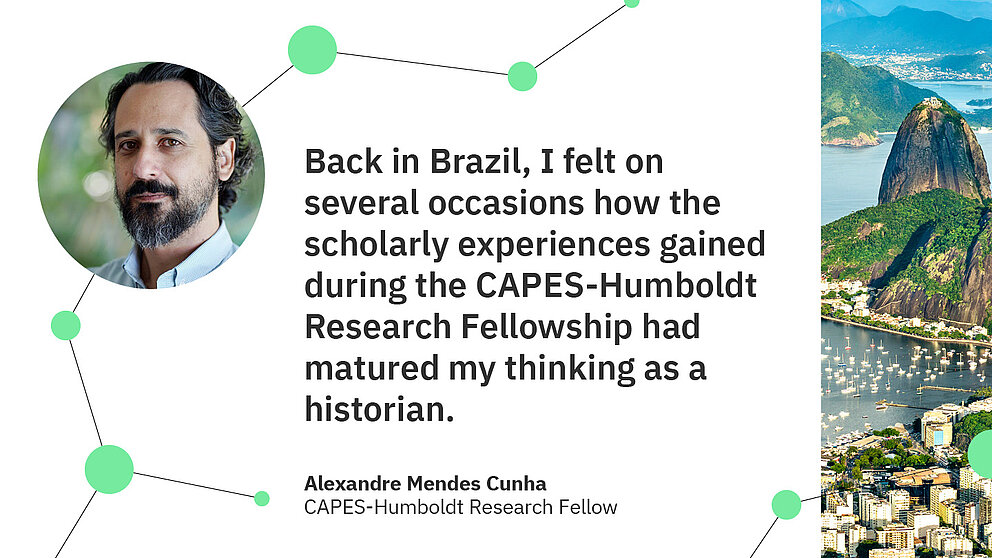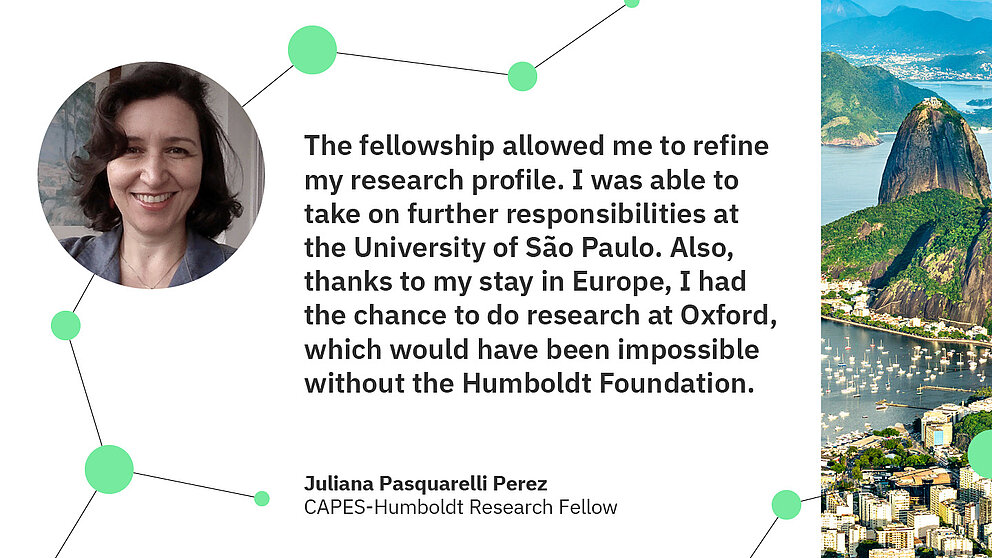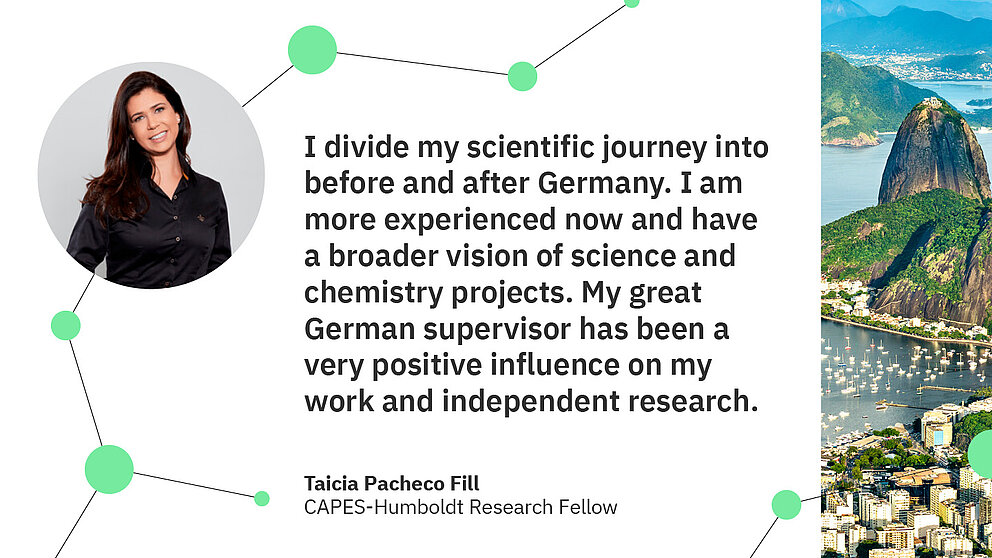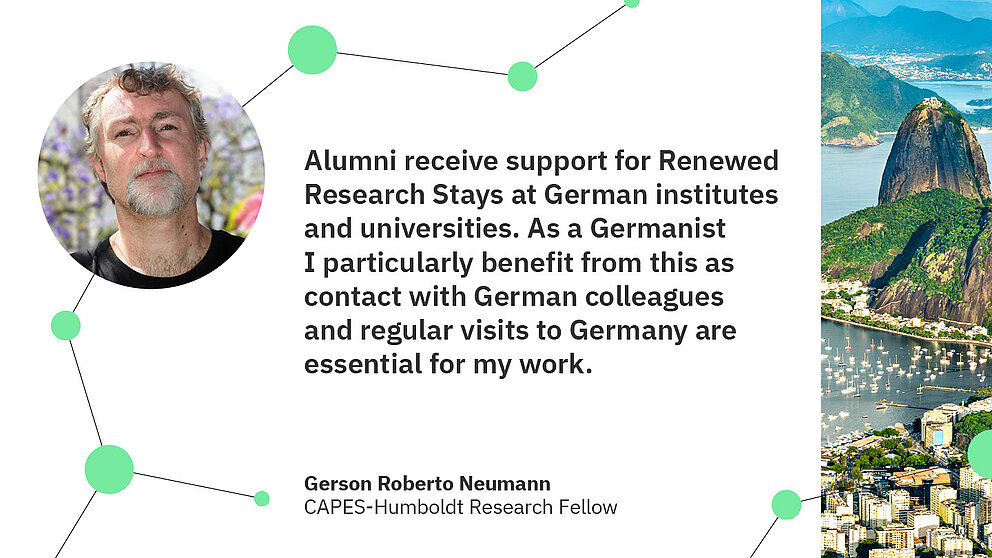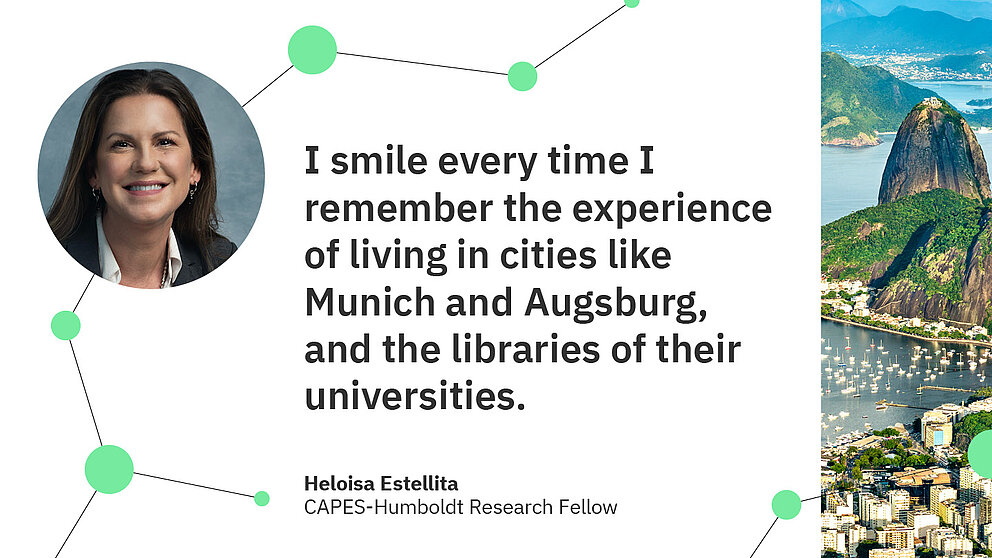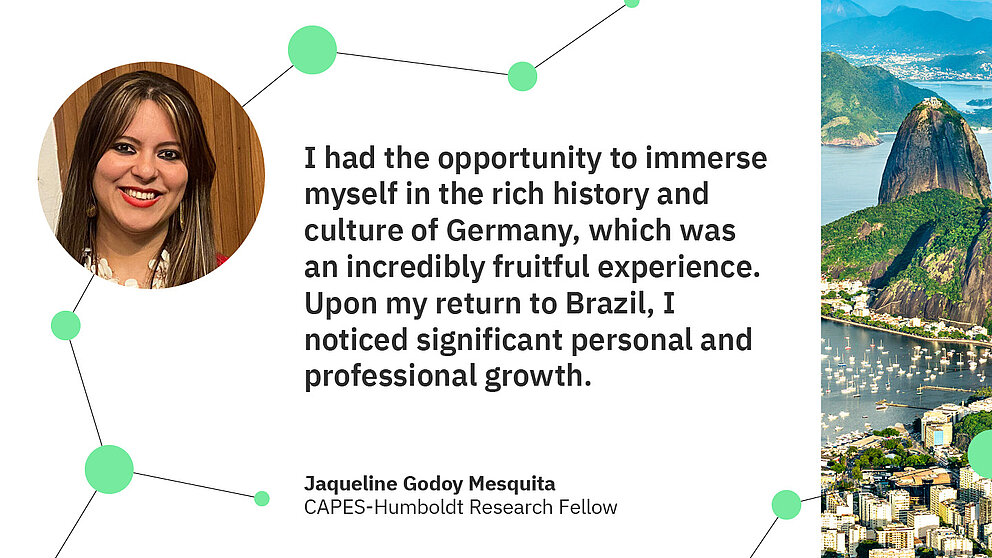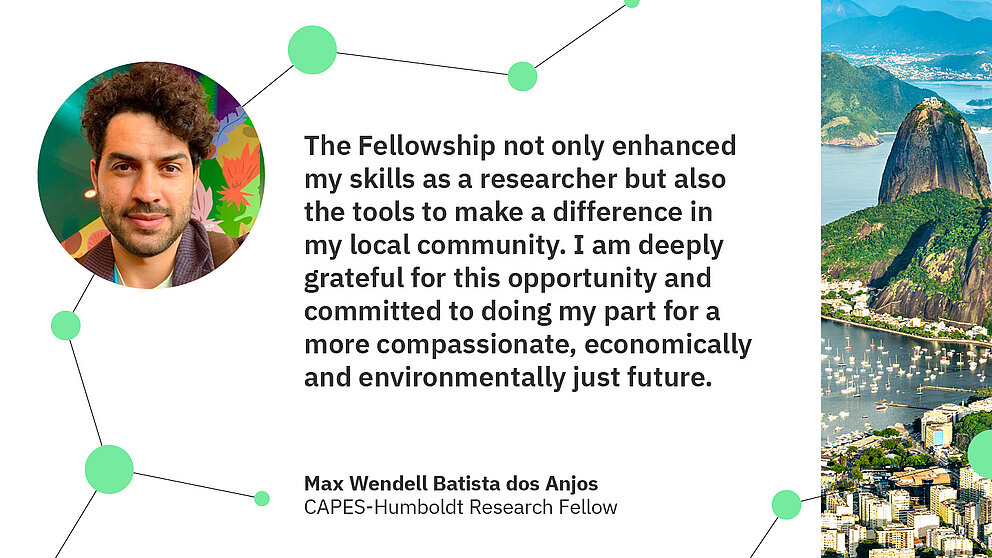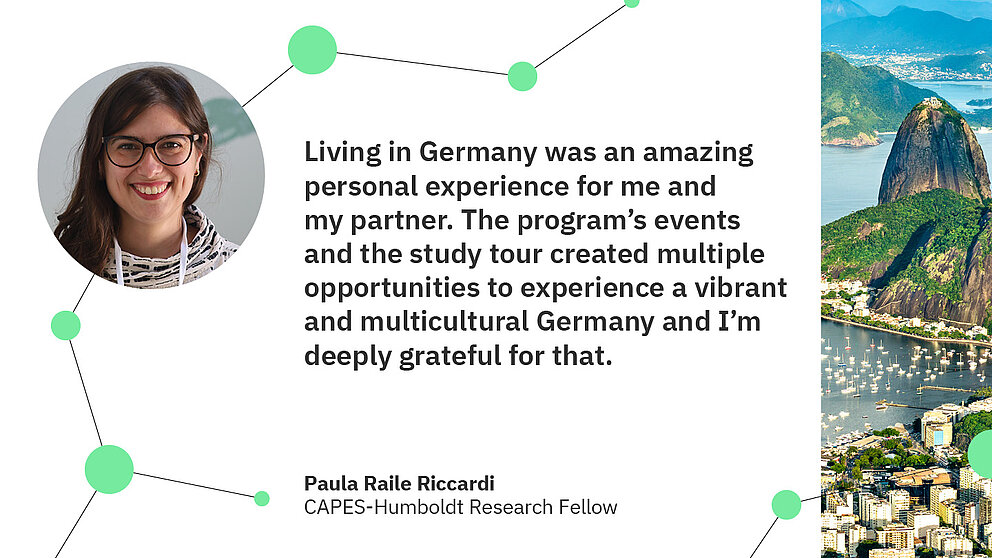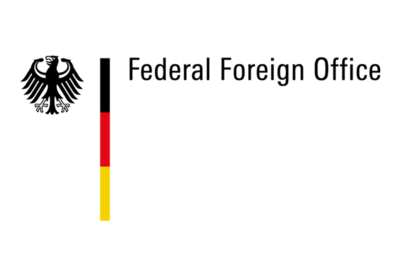Jump to the content
- {{#headlines}}
- {{title}} {{/headlines}}
Applications for CAPES-Humboldt Research Fellowships are now possible again! Please note the application deadlines.
Atenção Pesquisadores! – Attention, researchers from Brazil! The CAPES-Humboldt Research Fellowship supports you – postdoctoral researchers and experienced researchers – with your research in Germany.
In 2013, the Brazilian research funding organisation CAPES (Coordenação de Aperfeiçoamento de Pessoal de Nível Superior) and the Alexander von Humboldt Foundation launched the CAPES-Humboldt Research Fellowship Programme. As a fellow, you will benefit from individual support from the Humboldt Foundation and our diverse sponsorship portfolio.
The Alexander von Humboldt Foundation aims to achieve a good balance between genders and a high level of diversity among its fellows in all areas. We therefore expressly invite female researchers and members of underrepresented groups to apply.
We welcome all applications, regardless of ethnic, cultural or social background, gender identity, age, religion, worldview, disability or sexual orientation.
What we offer
The CAPES-Humboldt Research Fellowship allows you to conduct your own research at various stages of your career in collaboration with a host at a German research institution of your choice. Host institutes will generally receive a subsidy towards research costs.
Postdocs
Benefit from research sponsorship in Germany at the beginning of your academic career. The CAPES-Humboldt Research Fellowship for Brazilian postdoctoral researchers enables you to conduct research in Germany. The monthly fellowship amount is €2,700 plus additional benefits. Fellowships may last from 6 to 24 months and can be divided into up to three stays within three years.
Experienced researchers
You can still apply for research sponsorship in Germany even if you are already well advanced in your academic career. The CAPES-Humboldt Research Fellowship for experienced Brazilian researchers enables you to conduct research in Germany. The fellowship amount is €3,200 plus additional benefits. Fellowships may last from 6 to 18 months and can be divided into up to three stays within three years.
General conditions
In addition to the fellowship amount and additional benefits, you will also receive personal support throughout your sponsorship. Prior to your research fellowship, you and your partner will be able to attend an intensive language course. You are then flexible to determine the start date of your fellowship yourself.
Further financial support, including family benefits for children and partners and allowances for travel expenses, is also available.
Alumni programmes
We stay in contact even after your research stay has come to an end. Our alumni sponsorship measures flexibly support every Humboldtian’s individual journey through life in both their careers and future research collaborations. A return fellowship or later visits to Germany are also possible.
You must meet the following criteria
The CAPES-Humboldt Research Fellowship addresses postdoctoral researchers from Brazil with above-average qualifications, regardless of their field.
Postdocs
Did you complete your doctorate within the last four years? Have you been published in academic journals and by publishing houses that are reviewed according to international standards? If so, and if you also fulfil the criteria under the “What is required of you” section, apply for the CAPES-Humboldt Research Fellowship for postdoctoral researchers.
Experienced researchers
Did you complete your doctorate within the last twelve years? Is your academic profile substantiated by an extensive list of publications in academic journals and by publishing houses that are reviewed according to international standards? If so, and if you fulfil the criteria under the “What is required of you” section, apply for the CAPES-Humboldt Research Fellowship for experienced researchers.
What is required of you
You must fulfil the following criteria to successfully apply for the CAPES-Humboldt Research Fellowship:
You must be a Brazilian national or have permanent resident status in Brazil. German nationals are eligible to apply provided that they have been living and working in Brazil for at least five years and on the assumption of permanence.
You must be resident in Brazil and have lived outside of Germany for at least 12 out of the last 18 months.
Confirmation that research facilities are available/host’s statement
A researcher from an academic institution of your choice in Germany will provide you with a mentoring agreement and written confirmation that research facilities are available as well as compiling a detailed review for you.
A researcher from an academic institution of your choice in Germany will provide you with a mentoring agreement and written confirmation that research facilities are available as well as compiling a detailed review for you.
Natural sciences and engineering: You must have a good knowledge of German or English.
Humanities, social sciences and medicine: You must have a good knowledge of German if this is necessary for successfully conducting your research. Otherwise, good knowledge of English will suffice.
Other
You must abide by the Rules of Good Scientific Practice (PDF) and the principles of scientific ethics. The foundation provides information on dealing with generative AI in the selection area.
You may not apply for the CAPES-Humboldt Research Fellowship if you have already received sponsorship from the Humboldt Foundation. In such cases, our alumni programmes are open to you.
How to apply
If you would like to apply for the CAPES-Humboldt Research Fellowship, please submit the necessary documents online only to both the Humboldt Foundation and Capes.
You can find the CAPES application documents and further information on the application process on the CAPESwebsite.
If you have any doubts or questions, please contact us (info@avh.de) before submitting your application. We are happy to help.
Documents to submit
What we need from you
Please note that you may only submit your application once you have uploaded the following documents in the application form:
- curriculum vitae (two pages max)
- research outline (five pages max)
- complete list of your publications (cf. sample list of publications)
- list of selected key publications (cf. sample list of key publications)
- key publications
- doctoral certificate
- German language certificate, if required
- if required: publisher’s acceptance notifications and/or acknowledgement of receipt and summaries/translations of key publications that are not available in English
- In addition:
host’s statement and confirmation that research facilities are available. Please note that these documents can only be uploaded in a protected area by the host personally. You can only submit your application once these documents have been uploaded. Further information and explanations can be found on the application form.
As soon as your online application is received, you will be sent written confirmation by email by both CAPES and the Humboldt Foundation.
Deadlines
The deadline for meeting certain formal conditions is the date on which your application is received.
The application deadline shall be 17:00 Brasilia time on the last working day in May or November respectively of the year preceding the planned research stay.
| Selection round | Application | Selection result | Start of the fellowship or language course |
|---|---|---|---|
| Call 18 | 7 Mar. 2022 – 31 May 2022 | until 25 Nov. 2022 | March 2023 – November 2023 |
| Call 19 | 1 June 2022 – 30 Nov. 2022 | until 25 May 2023 | September 2023 – May 2024 |
| Call 20 | 1 Dec. 2022 – 31 May 2023 | until 27 Nov. 2023 | March 2024 – November 2024 |
| Call 21 | 1 June 2023 – 30 Nov. 2023 | until 27 May 2024 | September 2024 – May 2025 |
| Call 22 | 1 Dec. 2023 – 31 May 2024 | until 25 Nov. 2024 | March 2025 – November 2025 |
| Call 23 | 3 June 2024 – 29 Nov. 2024 | until 26 May 2025 | September 2025 – May 2026 |
| Call 24 | 2 Dec. 2024 – 30 May 2025 | until 5 Nov. 2025 | March 2026 – November 2026 |
| Call 25 | 2 June 2025 – 28 Nov. 2025 | until 25 May 2026 | September 2026 – May 2027 |
The selection procedure
Your application will essentially be assessed on your individual academic qualifications. Fellows will be selected by a committee appointed by both CAPES and the Humboldt Foundation. The decision will be based on the documents you submit, the host’s statement and, usually, two independent peer reviews requested by CAPES and the Humboldt Foundation.
In past years, on average, 20 to 25 per cent of applicants have received a fellowship.
All the best for your application!
Questions and answers
No, an English language certificate is not required.
The relevant date is that of completing the final academic part of the doctoral process (e.g., defence of thesis, doctoral viva). This date will usually be included on your doctoral certificate alongside the date of issue. The key date for calculating the period following your doctorate is the date on which your application is received by the Humboldt Foundation.
In the case of multiple doctorates, the effective date is that of the first doctoral degree (PhD/CSc.).
Yes. You should, however, already have a clearly recognisable own research profile and, as a rule, be working at the level of at least assistant professor or junior research group leader, or have a record of several years of independent scientific work.
We cannot consider your application for a fellowship for postdoctoral researchers if your doctorate was completed more than four years ago. In case you already have a clearly recognisable own research profile and, as a rule, working at the level of at least assistant professor or junior research group leader, or have a record of several years of independent scientific work, you can apply for a fellowship for experienced researchers. If you have passed the deadline, an exception may be made in well-founded cases (e.g. recognition of parental leave).
We cannot consider your application if you obtained your doctorate more than twelve years ago. If you have missed the deadline, an exception may be made in well-founded cases (e.g. recognition of parental leave).
Periods in which you interrupted your academic activities after completing your doctorate in order to rear children may be taken into account as career breaks after examination. The proportionate offsetting of such periods is also possible. A maximum of two years may be claimed per child. Please always indicate child-rearing periods when filling in our application form.
Mothers can claim two extra years for each child born after their PhD plus any further verifiable parenting periods. Fathers and other persons responsible for raising children are only credited with verifiable parenting periods.
In general, postdocs may apply up to four years, and experienced researchers up to twelve years after completing their doctorates. Recognized child-rearing periods may correspondingly extend these maximum timeframes during which the submission of applications is possible. The extension is limited to 6 years.
Please contact info[at]avh.de if you have any questions.
Yes, because the assessment of academic achievements is always made on an individual basis at the Humboldt Foundation. Therefore, when filling in the application form, please specify all periods in which you partially or completely interrupted your academic activities after finishing your doctorate in order to rear children.
The voluntary disclosure of private circumstances may help increase equal opportunities during the selection process. The consideration of your personal circumstances allows for a fairer assessment of your academic achievements.
Please contact info[at]avh.de if you have any questions.
- Natural scientists and engineers: good knowledge of German or English is sufficient.
- Scholars in the humanities and social sciences: should have knowledge of German if it is necessary to carry out the research successfully. In this case, a German language certificate confirming proficiency must be submitted. Otherwise, a good knowledge of English is sufficient.
- Physicians: If the research involves work with patients, the candidate must have a good knowledge of German (language certificate required). Otherwise, a good knowledge of English is sufficient.
No, a language certificate is not required.
You are eligible to apply if you hold a research doctorate or a comparable academic degree.
In addition, please read our Admission Questionnaire for Physicians (MD / Dr. med.) for detailed information.
If you have several research doctorates, the above mentioned FAQ on the subject of "several doctorates" applies.
Applicants must reside in Brazil at the time of application and must have resided outside Germany for a minimum of 12 months in total in the 18-month period prior to submission of the application. Any time spent in Germany within those 18 months is taken into account, regardless of duration or reason.
Any person who, regardless of their country of residence, has supported themselves for more than six out of the last 18 months with financing from a German institution or who has worked on a doctoral project at an institution in Germany in the last 18 months is not eligible to apply.
German citizens and/or educational residents* (see following FAQ) are generally ineligible to apply if they have been in Germany within the last 18 months prior to receipt of their application or are already in Germany at the time of applying.
If in doubt, please contact us before submitting your application so we can advise you (info[at]avh.de)
The aim of the programme is to enable highly qualified academics from abroad to come to Germany to conduct a research stay here. German citizens/educational residents are thus not the target group of this funding programme (Educational residents are individuals who have completed their school education and a university degree, or a university degree and their doctorate in Germany).
You are however eligible to apply if you are permanently working in Brazil and intend to return to Brazil immediately following the requested research stay.
We consider these preconditions as fulfilled if your habitual place of work and residence has been located in Brazil on the assumption of permanence for at least five years and if in addition you either have:
a. Brazilian nationality
and/or
b. Permanent residence visa in Brazil
If you intend to apply in order to prepare your permanent return to Germany, we recommend that you instead apply to the “Temporary Positions” programme of the DFG.
If in doubt, we would ask to send us only your complete CV and a list of your publications, so that we can advise you (info[at]avh.de).
Any researcher working at a university or research institution in Germany who offers to make research facilities available for the proposed research stay.
If you have already worked in Germany for a longer period of time (12 months or more) you should look for a new academic environment for another guest stay in Germany. Applications that involve returning to the supervisor of the doctoral thesis or to the mentor of a longer postdoctoral stay are generally rejected by the Selection Committee on the basis of a lack of further independent academic development.
Individuals with whom you are in a close personal (marriage or civil partnership) or familial (parents, siblings, children) relationship cannot be selected as hosts.
You are free to choose your own academic host. The Humboldt Foundation does not provide any direct support in finding a host.
We would like to draw your attention to the following search engines for hosts and research institutes:
- Institutes at German universities and other research institutions
Searchable Portal (GERiT) of the German Research Foundation (DFG) and the German Academic Exchange Service (DAAD) - Research facilities, disciplines and research in Germany (only in German)
Research portal of the Federal Ministry of Education and Research (BMBF) - Research Map
Hochschulrektorenkonferenz (HRK) - Research facilities, researchers and projects of the DFG in Germany and worldwide
GEPRIS - Database of the German Research Foundation - Research facilities, disciplines and researchers in Germany and worldwide
World of Learning - KISSWIN
Communication and information platform on career paths and funding opportunities for junior academics
We would also like to draw your attention to the open access part of the Network Online. This database features a large proportion of the Foundation's more than 25,000 academics sponsored worldwide. Here you can search for names, disciplines and keywords.
Yes. If the hosts work at different research institutes, they must each provide a host's statement and confirmation that research facilities can be made available.
In general the host institute will receive an allowance for research costs of €800 per month for research in the field of natural sciences and engineering, and €500 for research in the field of humanities or social sciences.
No, it is not possible to apply to several fellowship programmes concurrently. Should you be rejected by any of them, you may, however, apply to any other programme as long as you fulfil the formal requirements.
On principle, it is possible to file parallel applications. You must, however, indicate this on the application form and inform us immediately of any other applications you submit and any other sponsorship decisions that occur while we are considering your application.
Under certain circumstances, research fellows may conduct research outside Germany during the sponsorship period if this is necessary to successfully carry out the research project (e.g. for field research, archive visits, experiments at specific facilities or cooperation with other research institutions) or for personal or organisational reasons (e.g. family obligations, health issues).
Fellows are only eligible to conduct research stays outside Germany if their research project is carried out at the host institute in Germany for a duration of at least six months, and the total duration of their research stays outside Germany should usually not exceed 25 percent of the expected total funding period.
Conducting research stays outside Germany at the very beginning or the end of the funding period is only permitted in exceptional cases as stays at these times could put the fellow’s integration and successful completion of the research project at the host institute at risk.
Additional earnings from freelance work or employment or from fellowships in the country where the research stay outside Germany takes place must be reported and will usually be deducted from the fellowship amount.
Applicants must apply for a stay of at least six months, which can, however, be divided up into two blocks of three months.
The research stay or language course can usually begin 12 months after the selection decision at the latest. Under certain circumstances, the start may be postponed for up to 12 months.
Please refer to our current programme information for details on the fellowship amount and additional benefits.
No, the fellowship cannot be paid retroactively.
A two- to four-month language course takes place immediately prior to the start of the research fellowship. The language fellowship is not part of the research fellowship. (In other words, if you apply for a two-month language course in connection with a 12-month research stay in Germany, your stay will last a total of 14 months.)
The intensive German language course can only be taken immediately prior to the start of the research fellowship. If this is not possible, you may apply for funds to attend evening classes during the research fellowship.
There is no obligation to take a language course. However, the Humboldt Foundation strongly encourages all its fellows and their partners to learn German during their research stay so that they can fully participate in social and cultural life in Germany.
The Humboldt Foundation welcomes the idea that fellows' partners and children should accompany them and encourages this by paying family allowances in addition to the fellowship, provided that the family members accompany the fellow for more than three months.
Yes, please submit two identical sets of your complete application documents – one to Capes and one to the Humboldt Foundation – in a timely fashion.
Please notice that the host documents have to be submitted only to the Humboldt Foundation.
Your host(s) will upload the required documents in a secure area, adding them to your application form. The links to this area can be found in the application form. Please send these links on a timely basis to the scientists/ academics you have named. Once all the documents have been uploaded, you will automatically be notified by email and will then be able to submit your application. You are responsible for ensuring that your documents are complete.
Your application must contain one copy of each of the key publications you have chosen. Other publications will not be accepted (exception: You may optionally submit published reviews of your key publications by other authors).
If you wish to cite your dissertation or habilitation as a key publication but have not yet submitted it for printing, please upload the original manuscript of your doctoral or habilitation thesis.
No. Please only cite publications that are already in print, have been accepted for publication or have at least been submitted to a publishing house. Please cite submitted publications without naming the journal or publishing house on your publication list. In the latter case you must include the acknowledgement of receipt from the publisher; in case of publications that have been accepted, please include the letter of acceptance from the publisher. Any other works cited on the list will be deleted.
Exception: Your dissertation or habilitation may be cited as a key publication even if you have not yet submitted it to a publisher. If you wish to cite your dissertation or habilitation as a key publication but have not yet submitted it for printing, please upload the original manuscript of your doctoral or habilitation thesis.
You yourself should choose the key publications from your publications. You should choose works which present your most important academic results. In cases of multiple authorship you should select those to which you have made a major contribution. When choosing key publications we recommend including works that reflect your more recent publication activity.
Please note that you cannot amend your selection of key publications once the selection process has begun.
If you are applying for a fellowship for postdocs, one key publication is sufficient. You may cite a maximum of three.
If you are applying for a fellowship for experienced researchers you must choose at least three key publications. You may cite a maximum of five. Surplus key publications will be removed from the list without notifying the applicant.
Please address the particular academic relevance of the results contained in the key publication and briefly explain the significance of the publication for your academic profile (cf. Sample key publications, PDF). In cases of multiple authorship please also indicate your own personal contribution to the publication.
Yes. Please cite all your publications in the complete list of publications, including your key publications. An unpublished dissertation or habilitation, however, may not be listed in the complete list of publications.
In this list the key publications should be cited without explanations (cf. Sample publication list).
Please note that the order of the authors on the publication list corresponds to the order of the authors on the submitted publication. Changing the order is against the Rules of Good Scientific Practice and may result in penalties. Please note that it is not possible to amend the list of publications submitted once the selection process has begun.
Your application will be reviewed by independent peer reviewers.
The final decision on all applications is made by the Selection Committee. The Selection Committee consists of researchers of all disciplines who decide on all applications by majority vote. The Humboldt Foundation and Capes have no vote on the Selection Committee.
In recent years, between 20% and 25% of all applications have been successful.
The essential aspect of the application is the individual applicant's academic qualification. Please refer to the relevant programme information for more details on the selection criteria.
It is possible to re-apply if you fulfil the eligibility criteria. The new application should, however, differ significantly from the original, rejected application. Generally, it makes sense to re-apply after developing one's academic profile, e.g. after academical publications have been accepted by internationally reviewed journals and publishing houses. Our experience shows that applicants should wait about two years before re-applying. Submitting a new application that differs little or not at all from the rejected original may result in a formal rejection of the new application.
In the case of unanimously rejected applications, a new application will be accepted only after 3 calls.
Insufficient publication record:
In particular, applicants who apply shortly afterupon completion of their doctoral thesis should ensure that the key findings of the doctoral thesis (key publications) are already published or have been accepted for publication. In case of doubt, it is a good idea to wait for several months before submitting the application until evidence can be provided that the key publications have been accepted.
Lack of academic development:
The chosen research project should not be a direct continuation of the doctoral thesis or of the academic work carried out to date. Returning to the same academic environment, e.g. returning to the supervisor of the doctoral thesis or the mentor of longer postdoctoral research (more than 12 months), or returning to a host institute where a longer research stay has already taken place, generally results in the rejection of applications on the basis of a lack of further independent academic development.
Lack of originality:
In the qualitative assessment of the key publications and of the research outline, the independent peer reviewers focus in particular on the originality of the work and the associated impetus for further development in this research area. If these aspects are not immediately apparent, if the research concerns more routine work or if the aims of the planned research and its significance for the continued development of the subject area are not clearly presented, applications are generally rejected.
Lack of personal academic profile, academic establishment:
In the experienced academics’ programme segment, the personal academic profile is of major importance for the assessment of applications by the independent peer reviewers and committee members. Therefore, applications are frequently rejected if
- no or insufficient publications are available in sole authorship or as a corresponding author;
- the applicants’ topics are too narrowly focused;
- no clear continued academic development is apparent;
- the research project is not clearly aligned with the research interests of the applicant;
- after several postdoctoral positions, another "traditional" postdoctoral position is applied for without the applicant becoming independently established academically in the meantime.
For experienced academics whose doctorate was completed more than eight years ago, rejection often results if a position as an independent academic (assistant professor, lecturer, junior research group leader, etc.) has still not been obtained, or if the prospect of a professorial appointment upon completion of the proposed stay is not apparent from the documentation submitted, especially the publication profile.

